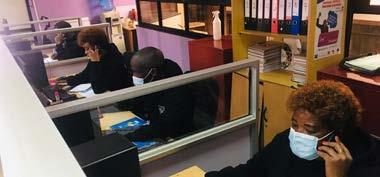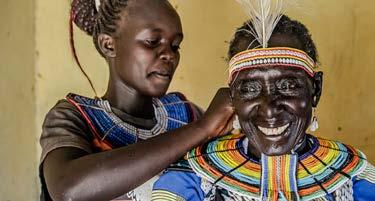
9 minute read
Global Youth Consortium
Kenya’s GBV Helpline
UsING DATA To TACKlE THE CUlTURE oF sIlENCE AND sECRECY oN FGM AND oTHER HARMFUl PRACTICEs
Advertisement
The calls of the national helpline for GbV was one of the first signs that all was not well. It was December 2020, about nine months into Kenya’s nationwide measures to contain the spread of CoVID-19.
After he received a distressing call, Peter*, a tele-counsellor for the national helpline, dispatched an ambulance to a village in Elgeyo Marakwet County.
“The caller reported that two young sisters had undergone FGM and both were experiencing excessive bleeding. one of them had fainted,” says Peter.
Peter contacted the Kenya Red Cross society. With the police providing security during the rescue operation, the girls received medical attention before being transferred to a local health facility.
FGM was outlawed in Kenya a decade ago. The sisters are currently staying in a safe house, where they will receive support to continue with their education.
“The FGM practitioner was arrested after further investigations by the area chief. she will not be harming any other girls,” says Peter.
Calls for help rose more than three-fold by December last year, Kenya’s national tollfree helpline number, HAK 1195, where Peter works, had received more than 6,000 calls from GbV survivors seeking services. This represents a 360% increase in cases recorded during 2019.
“The pandemic helped raise the alarm on the safety of women and girls,” says Jane*, the lead tele-counselor. “It also revealed the social and economic vulnerabilities that expose them to violence.
For seven years she has worked on the team of telecounsellors providing 24 hour services to survivors. This includes psychosocial support and access to services such as health care, shelters, legal aid, police assistance and emergency ambulance rescue.
The helpline is operated by a local non-profit organisation, Healthcare Assistance Kenya (HAK), in partnership with the Ministry of Public service and Gender. UNFPA and UN Women provide technical and financial support and raise public awareness of the helpline to enhance access to GbV services during the CoVID-19 crisis. increase the capacity of the helpline’s database for improved data collection and use. The new database captures information on a set of indicators, with the aim of strengthening the response to and prevention of GbV. The disaggregated data will better inform planning.
“The data helps us map out the different types of GbV, including the most commonly reported, where they occur, and the ‘people’ most affected,” says UNFPA GbV/Gender Advisor, Caroline Murgor. shared with the government and other partners of the GbV Technical Working Group, the data has helped quantify the extent of the problem. They are used to design policies and programmes based on evidence.
Ending FGM in Kenya by 2022. Kenya has an FGM prevalence of 21%, while the government has committed to eliminating the practice by 2022, trends in the helpline data show that the harmful practice is one of the


HAK Director, Fanis lisiagali attributes this to the culture of silence and secrecy that surrounds the practice.
“looking at the data, we can identify the areas where more advocacy and awareness is needed to empower women to speak up against FGM and all forms GbV ,” she says.
Through the Joint Programme on the Elimination of FGM/C, UNFPA has supported various community dialogues and awareness campaigns using community radio to sensitize the public on preventing and responding to FGM. Through these efforts, more than 1 million people have been reached with At the Generation Equality Forum held in Paris, France, President Uhuru Kenyatta committed to introducing a module on GbV in the 2022 Kenya Demographic Health survey. This will strengthen the use of gender statistics in the design and scale-up of FGM and GbV programmes, in line with the presidential plan on ending FGM.
“It is my personal commitment to end FGM in Kenya by the end of my tenure,” said President Kenyatta.
The FGM-toll-free helpline number, HAK 1195,...received more than 6,000 calls from GBV survivors seeking services
*Names have been changed to maintain confidentiality.
CoVEr FEaTUrE, They play a keypart !
angelique Kidjo
Renowned singer and songwriter Angelique Kidjo is the Goodwill Ambassador for UNICEF and a passionate advocate for girls’ education. Her advocacy challenges African leaders to be at the forefront of efforts to eradicate FGM, which she says, “diminishes” women and sought to destroy their identity.
she urges all UN Member states and communities to outlaw FGM/C and raise awareness about its harmful effects, especially in African countries where the practice is most prevalent.
she states, “We can have help from around the world, but if there is no political will… we won’t see a change”.
The Grammy-winning artist, Ms. Kidjo, who was born in benin, urges all states to sign up to UN HRC 44/16, which calls for global action against FGM.
ifrah ahmed
Ifrah Ahmed is an FGM survivor, activist and UNHCR’s High Profile supporter. A staunch advocate for the elimination of FGM, a victim herself; she has successfully spearheaded the establishment of legislation banning the practice in Ireland. The 2020 film, ‘A Girl from Mogadishu’ inspired by Ifrah’s life experience through trafficking, FMG and refugee camps, drew the attention of the global community and somalia in particular on the horrors of FMG and more. Her participation in the UNHCR six-part series, ‘Too Much Pain: The voices of refugee women’ in 2014, spurred somalian parents to seek medical attention for their children who had experienced FGM.
“let’s not allow our daughters to suffer the pain we’ve undergone”, says Ifrah Ahmed, in continuous advocacy through the Ifrah Foundation.
Mariam Dahir
Mariam Dahir, a medical doctor and an anti-FGM activist, was influenced by the effects of FGM experienced with her patients. In taking actions for the elimination of this practice, she decided to address through education, which saw the inclusion of FGM in the medical curriculum, while working alongside the UNPF to address these issues in somalia. she indicates that “things are changing [...] More people are speaking out against FGM in
Efe Eric ambrose
Efe Eric Ambrose is a Nigerian professional footballer (former Celtic player), who advocates with the global movement sponsored by the UNFPA on actions against FGM.
He has joined forces with his two daughters, backing a campaign to end FGM in a video clearly expressing his stance saying: “My daughter is born Perfect. say no to FGM”.
jaha Dukureh
Jaha Dukureh is Founder and Executive director of ‘safe Hands for Girls’, which has as objective to end FGM in The Gambia. Dukureh was subjected to FGM at just a week old. she has been the lead campaigner in The Guardian’s ‘End FGM’ Guardian Global Media Campaign. Her activism culminated in the banning of FGM in The Gambia. Passionate about the course, she indicates, “These issues are personal to me, they’re part of my life history. We won’t have equality until girls can grow up with control over their own bodies and future,” she states. “I am proud to join UN Women in their fight for the rights of women and girls all over Africa. I want to see the day when no parent makes a decision that will change and limit the lives of their daughters. The girls of Africa and worldwide need to know that their future is bigger than they imagine.”
Dr. Nafissatou Diop
Dr. Nafissatou Diop is the Chief of branch, Gender and Human Rights branch, Technical Division, UNFPA, in accelerating change in support of government efforts to eradicate FGM and address gender inequality. she believes that advocacy is based on providing evidence through research solutions to the why, the how and the outcomes of FGM. In her talk at Women Deliver 2019, the world’s largest conference on gender equality, about what it will take to end FGM and what keeps her fighting, she stated ‘If you want to end FGM, you need to think about spreading the movement and changing this norm within an ethnic group. This is why we talk a lot about cross-border issues.’
Nimco ali oBE
Nimco Ali obE is a leading voice in the UK and globally on violence against women and girls. As CEo of The Five Foundation and The Global Partnership To End FGM, she brings a wealth of both first-hand and professional experience in how to best protect and promote the rights of women and girls. Nimco has spearheaded the campaign to elevate FGM as a priority issue in the UK and globally, including persuading sudan to ban FGM in recent months, and changing the narrative on how grassroots efforts to end FGM on the African continent and beyond need to be properly funded. she told the UK government, “I am delighted to advise the UK government on its pivotal efforts to end violence against women and girls on an independent basis.”
rugiatu Turay
Rugiatu Turay is a sierra leonean women’s rights activist and anti-FGM campaigner. Turay takes action for the abolition of FGM through her organisation, the Amazonian Initiative Movement (AIM). she is also a member of the soroptimist six activist group, which is backed by the sI Road to Equality’s President’s Appeal. Rugiatu Turay has been awarded the Theodor Haecker Human Rights Prize for her efforts in sierra leone to end FGM and says, “I decided that we needed to engage these people. They needed to know that we have ran away from violence committed to us by people and we are now perpetuating that violence on
Tiken jah Fakoly
Tiken Jah Fakoly is an Ivorian reggae singer. He uses his music to talk about the struggles and fears of people in African society, including those experiencing FGM. The king of reggae performed a song written specifically for and dedicated to this cause during a concert in AsMARA, Eritrea in 2012 to raise awareness about FGM. This, in turn, is expected to have a significant impact on changing behaviours and attitudes, resulting in a gradual increase in societal awareness of the effects of FGM.
Tony Mwebia
Tony Mwebia, Founder & Executive Director Men End FGM is an award-winning sDG 5 Advocate who focuses on ending FGM through grassroots campaigns and writing, as well as advocating for sexual and reproductive health and rights. According to the course of his foundation, “not involving men in actions against FGM is like a doctor treating symptoms but ignoring the disease”.
Shinina Shani
shinina shani works at Angelican Development service south Rift as a resource mobilizer and gender advocate officer. shinina has campaigned against FGM/C for the past 20 years. she gives out her phone number to girls in her hometown of Narok, Kenya, who are trying to avoid being “cut” and says that “the few girls who choose to avoid it are shunned and referred to as cowards and fake Maasais. They believe it is a bad omen to remain “uncut” and have children,” she told Daily Nation newspaper.










